Bandung
Bandung: A refreshing day trip from Jakarta
Date visited: July 2023
Getting There
Taking the train is the best option. The most frequent departures are from Gambir Station in Central Jakarta. The fare is reasonably priced, and the trip takes slightly less than 3 hours. In October 2023, a new ultra-high-speed rail service between the two cities is scheduled to begin with travel time cut to approximately one hour.
Panorama Train
Speaking of trains, consider making one leg of your round trip on the Panaroma Car of the train. It only costs about $10 dollars more than Executive Class, but you get baggage service, free beverages and snacks, and an incredible view of the surrounding scenery in a train car that is enclosed in glass for panoramic views. Reserve in advance online because seats go quickly, especially on weekends.
Refreshing Weather
When I visited Bandung, the temperature was about 3-5 degrees C cooler than Jakarta due to Bandung’s higher elevation. I found it a pleasant relief from the heat and humidity of the lowlands.
Museum Geologi
This might be best museum in Bandung. It’s a massive collection of anything related to geology, including a few giant dinosaur fossils. It’s worth a side trip, especially if you’re scientifically inclined.
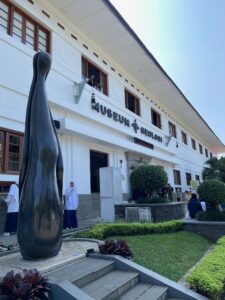

Grand Mosque
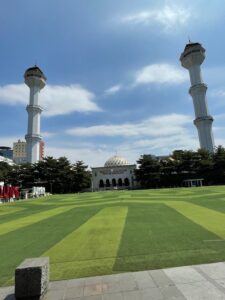
If you’re interested in religious architecture, then make a brief visit to Bandung’s Grand Mosque. The two enormous 81-meter minarets cast an impressive shadow over the city.
Braga Street
Braga Street is the trendy avenue housing art galleries and shops as well as some vintage colonial architecture. It’s also the spot for nightlife if you’re into that.
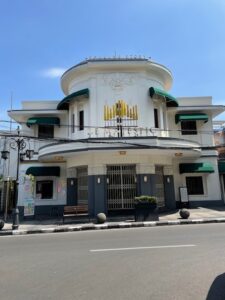
If you are staying in Bandung for more than a day, then you might enjoy a nice excursion to the…
Lembang Floating Market
Lembang is a city in the hills above Bandung. I hired a car to make the hour-long journey on a Sunday morning. There are lots of small tourist attractions in and around Lembang, so there are hordes of locals on the road, making it a challenging trip with traffic almost as congested as Jakarta’s, so give yourself sufficient time for the journey. The Floating Market is not an “organic” place organized by the area’s residents, but is, instead, an artificial attraction created for tourists. So, it’s not really “authentic” (whatever that term means exactly).
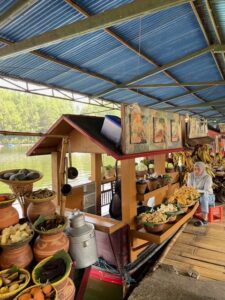
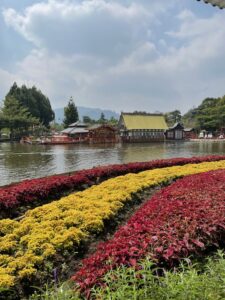
Even though it’s “touristic” and you’re charged an entry fee, I enjoyed it. The dozens of boats floating on the man-made lake were quaint and the surrounding gardens were lovely, certainly by North American standards. And the vendors on each boat cook up a variety of Indonesian street food, which all appeared to be “authentic” and delicious. The snack I had was tasty and reasonably priced, and I also had fun observing its preparation. One hint: the food vendors don’t accept cash—you need to purchase tokens at a kiosk near the boats to pay for any snacks you wish to consume.
Near the Floating Market is the Mini Kota (miniature village). Unless you are six years old or under, I would recommend avoiding that attraction altogether.
Lots More
There are many other things to do in and around Bandung, such as volcanic explorations (Kawah Putih, for example) and touring picturesque tea plantations. I only had a couple days, so I was only scratching the surface of what one could do. A good guidebook (e.g. Lonely Planet) or a quick internet search can lead you to many other touristic possibilities in the vicinity.
